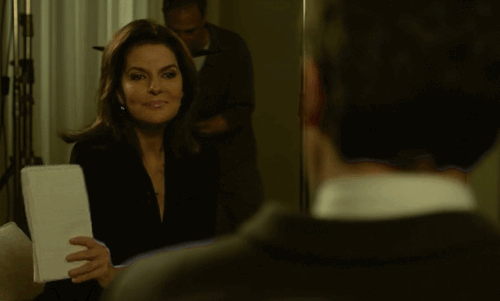gone girl spoilers incoming. (which i thought was in like, sixth sense territory at this point, but apparently not. so just in case.)
i found out about archive.org's lending library late last year, and i've been trying to take advantage of it (even moreso now thanks to recent legal developments). of course i'm only ever reading movie-adjacent stuff: i read get shorty after i enjoyed my jackie brown/out of sight elmore leonard double feature, and i just recently finished killers of the flower moon. at a point in between, though, i swerved towards the blunderer by patricia highsmith, after a podcast's tangent lead me towards it. i was embarrasingly unfamiliar with highsmith's name (though i at least recognized some of the titles in her google results), but i REALLY loved it. simmering psychological warfare between two accused murderers trying to avoid being taken down by the other.

pic related
a central question being (in the vaguest possible terms): whether there's a difference between doing something, and coming very, very close to doing something. and, if there is a difference: does it matter to the people that think you're one or the other? the ending seems to come to the conclusion "go fuck yourself". a premise based upon perceived guilt, and themes of suburban marital malaise, reminded me of a movie i had seen, and a book i had bought but not read, gone girl. guy who has only seen one movie, reading his first patricia highsmith novel...
 ... i said, and then 200 pages into gone girl, i looked at the back cover for the first time.
... i said, and then 200 pages into gone girl, i looked at the back cover for the first time.
i enjoy suburbatory as portrayed by flynn and highsmith-- including highsmith's deep water, which i read after gone girl (and loved even more), and flynn's sharp objects, which i read back in high school (and should probably reevaluate)-- the existential despair of it all is very potently understood. and i can appreciate it at a very personal level, especially flynn's added injury of moving back to your hometown. (flynn can think of the only thing more fucked up than growing up in kansas; growing up in missouri.) on the list of fake problems carried around by my people, i find a lack of artists influenced by that particular kind of banality. the only other two i know of are tim burton and donald fagen. i have strong feelings about one of these people.
in my short sampling of their work so far, flynn's observations are a lot more quippable, while highsmith often simmers between the lines (especially in deep water). spoken vs. unspoken resentment, and i find the latter way more effective. i want to call gone girl "stupider", but it's absolutely not bad, just that it's got a hard act to follow. it comes off like a pop cover of highsmith's sensibilities.
so thematically decadent, though, which is a delightful little playplace for me. and for amy dunne, too-- who employs patriarchal norms as narrative tropes, Dead Wife, Bad Husband. amy playing her part and writing the story. nick has terminal movie brain, too, but a kind that keeps him untethered from reality; he eventually has to realize that the only way to fight back is to write back. it's so cute when couples are collaborators. not to mention when amy's story spirals out of her control, and gets so big that it finds her and ruins the resolution she planned; call that death of the author!!


lol @ the contrast of this shot/reverse shot.
i'm sort of stuck on how i'm supposed to read flynn's tone here; whether nick dunne's quippy sardonic tone is unintentionally grating, or a deliberate smackdown on the writer's-brain of the era. (and fake-amy's diary writing reminded me of my own; i don't mean to compare myself to a published author, i'm just concerned i sound just as sociopathically floral.) still haven't seen the social network, but it'd be very poetic if david fincher had made two iconic texts on how humanities majors and STEM majors are each specifically insane.
Nick: I can't recall a single amazing thing I have seen firsthand that I didn't immediately reference to a movie or TV show. A fucking commercial. You know the awful singsong of the blasé; Seeeen it. I've literally seen it all, and the worst thing, the thing that makes me want to blow my brains out, is: The secondhand experience is always better. The image is crisper, the view is keener, the camera angle and soundtrack manipulate my emotions in a way reality can't anymore. I don't know that we are actually human at this point, those of us who are like most of us, who grew up with TV and movies and now the Internet. If we are betrayed, we know the words to say; when a loved one dies, we know the words to say.
Detective Gilpin: "Just wanted to make sure she wouldn't have had to go through, I don't know, a janitor or someone."
Nick: "No Freddy Krueger types here, that I've noticed."
Gilpin: "Never saw those movies."
in the past i'd seen comments from mutuals that found the book/movie very antifeminist, which wasn't unwarranted. the twist very easily plays into false accusation fearmongering (which was probably still a thing in 2012, but maybe slightly less radioactive). it is pretty weird that there aren't more men who love this movie for the wrong reasons. i think it helps that amy comes off as deeply relatable to a lot of women (probably as relatable as nick dunne is to a lot of men, but i guess the ladies got there first). amy might be one to play the gender card, but she resents her place in the game as much as nick does.


personally, i don't mind too much. if the novel is too on-the-nose, that also reflects an eagerness to get its hands thoroughly filthy with its subject matter and its implications, which i can admire. and i find that any issues of unsubtlety become even more apparent when the novel does decide to moralise: see nick dunne's realization/affirmation that his murderous hatred of amy is not the same as his his abusive father's general misogyny.
Nick: I swear I saw a blank whiteness for just a second, a moment of complete, jarring clarity. I stopped trying to block my father's voice for once and let it throb in my ears. I was not that man: I didn't hate and fear all women. I was a one-woman misogynist, If i despised only Amy, focused all my fury and rage and venom on the one woman who deserved it, that didn't make me my father. That made me sane.
it's the kind of clumsy, "necessary" story beat that reminds me of that repeated discourse that a story should explicitly disavow its characters' terrible actions. nick's fear that his anger is his father's anger is a messy, relatable question, but i don't know if we need the answer. counterpoint, though-- i lack storytelling sensibilities, and my order of events might be wrong-- is this supposed to be the narrative beat that clarifies nick was never violent towards amy (presented differently, but just as literally, in the film)? because in that case, it is a neccesary dramatic moment, in order to clarify where sympathies should lie.
probably the biggest re-characterization in the film is that detective gilpin goes from an underregarded small-town cop to more of a no-nonsense procedural-detective. (nick and amy's POV might factor into the novel's characterization, but the movie makes me consider fincher's POV when it comes to his criminal oeuvre.) INB4 ACAB, but i enjoy this version of her, and it strengthens a thread that i see more prominently in the movie: women's (mutual) dislike of amy dunne, as if they can smell the deceit on her, whereas the men typically fail to process a woman as a person.
true crime culture is a relatively minor theme of gone girl-- it's more like media sensationalism in general. but there's an extra bit of meat on that particular bone: the woman deliberately painting herself as the waifish victim supports a different kind of rhetoric if you emphasize her whiteness. maybe you've read about how self-victimization factors into the majorly white-female audience for true crime. i think if you tweak/emphasize the racial dynamics of this story, it easily slots into that extra layer of thematic depth. not that more themes = better, it's just like, you've basically got it all there. but making something racially diverse specifically to a thematic end can easily become disingenuous, so idk. and gillian flynn is a white lady so who knows how tactful this would be.
FWIW, the one person of color i noticed in the novel-- an extremely minor player-- is the blogger that interviews nick and allows him to share his "candid" side of the story, which finally starts turning public opinion in his favor. (saying "it's always the husband" is JUST as bad as racism. ) in the movie, she's left out, but nick's lawyer is played by tyler perry. (i don't think his race is specified in the book, and i'd assumed he had more of an orange-tan blonde-hair veneers-and-gold-rings thing.) not dissimilar in terms of protagonist support, but also not as flattering as an independent journalist.
photo/quote notes i couldn't find a shoehorn for elsewhere in this post. i forgot how to write, sue me.


i like how horror these shots are.

a lot of people mention the (pitch perfect, and very funny) smile that nick gives in front of amy's missing poster, but this moment of him visibly struggling to not social-smile is also great.
in any case, i love gone girl's ending to bits (and i daresay flynn can stick a landing better than highsmith). it's suffocatingly thematic, but in the best way: hellishly surreal to the point of being true-to-life. (this baby will save my marriage! it'll prove i'm nothing like my father!). though i especially love the twisted made-for-each-other angle that's present in the book. hot.
Amy: It really is true. It took this awful situation for us to realize it. Nick and I fit together. I am a little too much, and he is a little too little. I am a thornbush, bristling from the overattention of my parents, and he is a man of a million little fatherly stab wounds, and my thorns fit perfectly into them.
I need to come home to him.
P.S. Personal Stuff:
been moved out from my parents' for over a month now! keeping the location vague for now, though i'm sure it'll come up eventually, and it would be exciting to be the first victim of a neocities crime. i've got friends here, just so you know. people would notice. here's an anecdote/hint, though; i went to a nearby independent movie theater for the first time, and was bewildered to find that the gift shop was selling the same akira kurosawa tote bag i had brought with me.
it's been so long since i updated this site that i missed the anniversary, oops. thanks to anyone's that's been reading! it's been a relief to exorcise myself into this thing, cringe and all. apologies, now and in advance, for the silence. give me some leeway while i remember how to be a person again, as much as i like being a website.